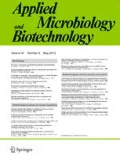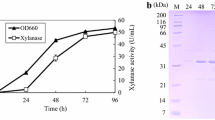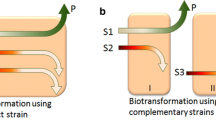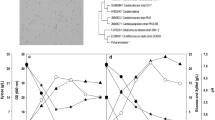Abstract
Polymalic acid (PMA) is a biodegradable polymer produced by the polyextremotolerant fungi Aureobasidium pullulans and has been shown to have potential applications in environmental fields. In this work, a high PMA yield mutant FJ-D2 was screened from T-DNA-based mutant libraries and showed a 12.9% increase in PMA titers, which was attributed to decreased the expression of a glycosyltransferase gene (celA), resulting in a 39.5% reduction in cellulose biosynthesis. Untreated waste xylose mother liquor (WXML), an environmental waste generated from the xylitol industry, can be directly used as an economical substrate for PMA production. Using batch-fermentation of FJ-D2, the PMA titer of 57.1 ± 0.02 g/L was produced in a 5-L fermentor, with the highest MA yield of 0.77 g/g mixed sugar. Furthermore, compared with ethylenediaminetetraacetic acid (EDTA), PMA had a comparable cadmium (Cd) removal efficiency (88.7% for EDTA versus 86.0% for PMA), which was not found in the monomer of L-malic acid (MA) monomers. These findings indicated that PMA was an environmentally friendly and biodegradable chelator for soil remediation. Moreover, our results provided an economically competitive process for PMA production from renewable environmental wastes.






Similar content being viewed by others
References
Almeida JRM, Modig T, Petersson A, Hahn-Hagerdal B, Liden G, Gorwa-Grauslund MF (2007) Increased tolerance and conversion of inhibitors in lignocellulosic hydrolysates by Saccharomyces cerevisiae. J Chem Technol Biot 82(4):340–349. https://doi.org/10.1002/jctb.1676
Chen Z, Chen XZ, Zhang LH, Wang JH, Shen W, Fan Y (2017) Metabolic engineering of Candida tropicalis for xyltiol production from xylose mother liquor. China Biotechnol 37(5):66–75
Cheng H, Wang B, Lv J, Jiang M, Lin S, Deng Z (2011a) Xylitol production from xylose mother liquor: a novel strategy that combines the use of recombinant Bacillus subtilis and Candida maltosa. Microb Cell Factories 10:5. https://doi.org/10.1186/1475-2859-10-5
Cheng H, Wang H, Lv J, Jiang M, Lin S, Deng Z (2011b) A novel method to prepare L-arabinose from xylose mother liquor by yeast-mediated biopurification. Microbial Cell Fact 10:43. https://doi.org/10.1186/1475-2859-10-43
Cheng C, Zhou Y, Lin M, Wei P, Yang S-T (2017) Polymalic acid fermentation by Aureobasidium pullulans for malic acid production from soybean hull and soy molasses: fermentation kinetics and economic analysis. Bioresour Technol 223:166–174. https://doi.org/10.1016/j.biortech.2016.10.042
Du Y, Hu X-F, Wu X-H, Shu Y, Jiang Y, Yan X-J (2013) Affects of mining activities on Cd pollution to the paddy soils and rice grain in Hunan province, Central South China. Environ Monit Assess 185(12):9843–9856. https://doi.org/10.1007/s10661-013-3296-y
Egli T (2001) Biodegradation of metal-complexing aminopolycarboxylic acids. J Biosci Bioeng 92(2):89–97. https://doi.org/10.1263/jbb.92.89
Ehsan S, Prasher SO, Marshall WD (2006) A washing procedure to mobilize mixed contaminants from soil: II. Heavy metals. J Environ Qual 35(6):2084–2091. https://doi.org/10.2134/ieq2005.0475
Evangelou MWH, Ebel M, Schaeffer A (2007) Chelate assisted phytoextraction of heavy metals from soil. Effect, mechanism, toxicity, and fate of chelating agents. Chemosphere 68(6):989–1003. https://doi.org/10.1016/j.chemosphere.2007.01.062
Feng J, Yang J, Li X, Guo M, Wang B, Yang ST, Zou X (2017) Reconstruction of a genome-scale metabolic model and in silico analysis of the polymalic acid producer Aureobasidium pullulans CCTCC M2012223. Gene 607:1–8. https://doi.org/10.1016/j.gene.2016.12.034
Feng J, Yang J, Yang W, Chen J, Jiang M, Zou X (2018) Metabolome- and genome-scale model analyses for engineering of Aureobasidium pullulans to enhance polymalic acid and malic acid production from sugarcane molasses. Biotechnol Biofuels 11:94. https://doi.org/10.1186/s13068-018-1099-7
Francis BR, Watkins K, Kubelka J (2017) Double hydrogen bonding between side chain carboxyl groups in aqueous solutions of poly (beta-L-malic acid): implication for the evolutionary origin of nucleic acids. Life (Basel) 7(3). https://doi.org/10.3390/life7030035
Gan S, Lau EV, Ng HK (2009) Remediation of soils contaminated with polycyclic aromatic hydrocarbons (PAHs). J Hazard Mater 172(2–3):532–549. https://doi.org/10.1016/j.jhazmat.2009.07.118
Gostincar C, Ohm RA, Kogej T, Sonjak S, Turk M, Zajc J, Zalar P, Grube M, Sun H, Han J, Sharma A, Chiniquy J, Ngan CY, Lipzen A, Barry K, Grigoriev IV, Gunde-Cimerman N (2014) Genome sequencing of four Aureobasidium pullulans varieties: biotechnological potential, stress tolerance, and description of new species. BMC Genomics 15:549. https://doi.org/10.1186/1471-2164-15-549
Hu CM, Zhao X, Zhao J, Wu SG, Zhao ZBK (2009) Effects of biomass hydrolysis by-products on oleaginous yeast Rhodosporidium toruloides. Bioresour Technol 100(20):4843–4847. https://doi.org/10.1016/j.biortech.2009.04.041
Leathers TD, Manitchotpisit P (2013) Production of poly(beta-L-malic acid) (PMA) from agricultural biomass substrates by Aureobasidium pullulans. Biotechnol Lett 35(1):83–89. https://doi.org/10.1007/s10529-012-1045-x
Li YS, Hu XJ, Song XY, Sun TH (2012) Remediation of cadmium-contaminated soil by extraction with para-sulphonato-thiacalix 4 arene, a novel supramolecular receptor. Environ Pollut 167:93–100. https://doi.org/10.1016/j.envpol.2012.03.042
Li H, Li T, Zuo H, Xiao S, Guo M, Jiang M, li z LY, Zou X (2016) A novel rhodamine-based fluorescent pH probe for high-throughput screening of high-yield polymalic acid strains from random mutant libraries. RSC Adv 6:94756–94762. https://doi.org/10.1039/C6RA20394A
Lim TT, Chui PC, Goh KH (2005) Process evaluation for optimization of EDTA use and recovery for heavy metal removal from a contaminated soil. Chemosphere 58(8):1031–1040. https://doi.org/10.1016/j.chemosphere.2004.09.046
Lv B, Zheng L, Liu H, Tang J, Hsiang T, Huang J (2016) Use of random T-DNA mutagenesis in identification of gene UvPRO1, a regulator of conidiation, stress response, and virulence in Ustilaginoidea virens. Front Microbiol 7. https://doi.org/10.3389/fmicb.2016.02086
Matthysse AG, Thomas DL, White AR (1995a) Mechanism of cellulose synthesis in Agrobacterium tumefaciens. J Bacteriol 177(4):1076–1081. https://doi.org/10.1128/jb.177.4.1076-1081.1995
Matthysse AG, White S, Lightfoot R (1995b) Genes required for cellulose synthesis in Agrobacterium tumefaciens. J Bioacteriol 177(4):1069–1075
Meers E, Ruttens A, Hopgood MJ, Samson D, Tack FMG (2005) Comparison of EDTA and EDDS as potential soil amendments for enhanced phytoextraction of heavy metals. Chemosphere 58(8):1011–1022. https://doi.org/10.1016/j.chemosphere.2004.09.047
Portilla-Arias JA, Garcia-Alvarez M, Martinez de Ilarduya A, Holler E, Galbis JA, Munoz-Guerra S (2008) Synthesis, degradability, and drug releasing properties of methyl esters of fungal poly(beta,L-malic acid). Macromol Biosci 8(6):540–550. https://doi.org/10.1002/mabi.200700248
Portilla-Arias J, Patil R, Hu J, Ding H, Black KL, Garcia-Alvarez M, Munoz-Guerra S, Ljubimova JY, Holler E (2010) Nanoconjugate platforms development based in poly(beta, L-malic acid) methyl esters for tumor drug delivery. J Nanomaterials 2010:1–8. https://doi.org/10.1155/2010/825363
Saxena IM, Brown RM (1995) Identification of a 2nd cellulose synthase gene (acsaii) in Acetobacter xylinum. J Bacteriol 177(18):5276–5283. https://doi.org/10.1128/jb.177.18.5276-5283.1995
Soleimani M, Hajabbasi MA, Afyuni M, Akbar S, Jensen JK, Holm PE, Borggaard OK (2010) Comparison of natural humic substances and synthetic ethylenediaminetetraacetic acid and nitrilotriacetic acid as washing agents of a heavy metal-polluted soil. J Environ Qual 39(3):855–862. https://doi.org/10.2134/jeq2009.0292
Tu G, Wang Y, Feng J, Li X, Guo M, Zou X (2015) Agrobacterium tumefaciens-mediated transformation of Aureobasidium pullulans and high-efficient screening for polymalic acid producing strain. Chin. J Biotech (Chinese) 31(7):1063–1072
Updegraff DM (1969) Semimicro determination of cellulose in biological materials. Anal Biochem 32(3):420–424. https://doi.org/10.1016/s0003-2697(69)80009-6
Wang AL, Wang Y, Jiang TY, Li LX, Ma CQ, Xu P (2010) Production of 2,3-butanediol from corncob molasses, a waste by-product in xylitol production. Appl Microbiol Biot 87(3):965–970. https://doi.org/10.1007/s00253-010-2557-8
Wang DY, He D, Li GQ, Gao S, Lv HY, Shan QS, Wang L (2014) An efficient tool for random insertional mutagenesis: Agrobacterium tumefaciens-mediated transformation of the filamentous fungus Aspergillus terreus. J Microbiol Methods 98:114–118. https://doi.org/10.1016/j.mimet.2014.01.007
Wei PL, Cheng C, Lin M, Zhou YP, Yang ST (2017) Production of poly(malic acid) from sugarcane juice in fermentation by Aureobasidium pullulans: kinetics and process economics. Bioresour Technol 224:581–589. https://doi.org/10.1016/j.biortech.2016.11.003
Xia X, Yang Z, Li G, Yu T, Hou Q, Mutelo AM (2017) Practicability of monitoring soil Cd, Hg, and Pb pollution based on a geochemical survey in China. Chemosphere 172:217–224. https://doi.org/10.1016/j.chemosphere.2016.12.082
Yang J, Yang W, Feng J, Chen J, Jiang M, Zou X (2018) Enhanced polymalic acid production from the glyoxylate shunt pathway under exogenous alcohol stress. J Biotechnol 275:24–30. https://doi.org/10.1016/j.jbiotec.2018.04.001
Zalar P, Gostincar C, de Hoog GS, Ursic V, Sudhadham M, Gunde-Cimerman N (2008) Redefinition of Aureobasidium pullulans and its varieties. Stud Mycol 61:21–38. https://doi.org/10.3114/sim.2008.61.02
Zan Z, Zou X (2013) Efficient production of polymalic acid from raw sweet potato hydrolysate with immobilized cells of Aureobasidium pullulans CCTCC M2012223 in aerobic fibrous bed bioreactor. J Chem Technol Biotechnol 88(10):1822–1827. https://doi.org/10.1002/jctb.4033
Zeng WZ, Du GC, Chen J, Li JH, Zhou JW (2015) A high-throughput screening procedure for enhancing alpha-ketoglutaric acid production in Yarrowia lipolytica by random mutagenesis. Process Biochem 50(10):1516–1522. https://doi.org/10.1016/j.procbio.2015.06.011
Zhang Y, Qu H, Zhao P, Tang Y, Zhou J, Luo S, Yin Y, Chen G (2017) Generation and screening of T-DNA insertion mutants mediated by Agrobacterium tumefaciens in the garden asparagus stem blight pathogen Phomopsis asparagi. Curr Microbiol 74(11):1270–1277. https://doi.org/10.1007/s00284-017-1312-0
Zhong YH, Yu HN, Wang XL, Lu Y, Wang TH (2011) Towards a novel efficient T-DNA-based mutagenesis and screening system using green fluorescent protein as a vital reporter in the industrially important fungus Trichoderma reesei. Mol Biol Rep 38(6):4145–4151. https://doi.org/10.1007/s11033-010-0534-z
Zou X, Zhou YP, Yang ST (2013) Production of polymalic acid and malic acid by Aureobasidium pullulans fermentation and acid hydrolysis. Biotechnol Bioeng 110(8):2105–2113. https://doi.org/10.1002/bit.24876
Zou X, Yang J, Tian X, Guo M, Li Z, Li Y (2016) Production of polymalic acid and malic acid from xylose and corncob hydrolysate by a novel Aureobasidium pullulans YJ 6–11 strain. Process Biochem 51(1):16–23. https://doi.org/10.1016/j.procbio.2015.11.018
Zou X, Cheng C, Feng J, Song X, Lin M, Yang S-T (2019) Biosynthesis of polymalic acid in fermentation: advances and prospects for industrial application. Crit Rev Biotechnol 39:1–14. https://doi.org/10.1080/07388551.2019.1571008
Funding
This study was financially supported in part by grants from the National Natural Science Foundation of China (Grant No. 31571816 and 31871783), Fundamental Research Funds for the Central Universities (XDJK2018AC002), National High Technology Research and Development Program of China (863 Program) (2015AA021005), and Chongqing Social and People’s Livelihood Guarantee Special Program (cstc2016shmszx80075).
Author information
Authors and Affiliations
Corresponding author
Ethics declarations
Conflict of interest
The authors declare that they have no conflict of interest.
Ethical approval
This article does not contain any studies with human participants or animals performed by any of the authors.
Additional information
Publisher’s note
Springer Nature remains neutral with regard to jurisdictional claims in published maps and institutional affiliations.
Electronic supplementary material
ESM 1
(PDF 601 kb)
Rights and permissions
About this article
Cite this article
Feng, J., Li, T., Zhang, X. et al. Efficient production of polymalic acid from xylose mother liquor, an environmental waste from the xylitol industry, by a T-DNA-based mutant of Aureobasidium pullulans. Appl Microbiol Biotechnol 103, 6519–6527 (2019). https://doi.org/10.1007/s00253-019-09974-x
Received:
Revised:
Accepted:
Published:
Issue Date:
DOI: https://doi.org/10.1007/s00253-019-09974-x




